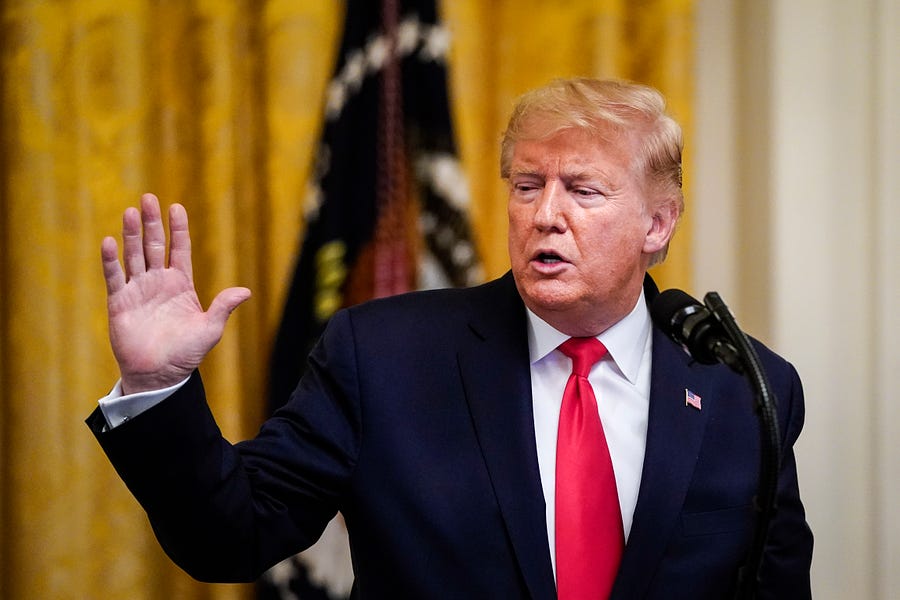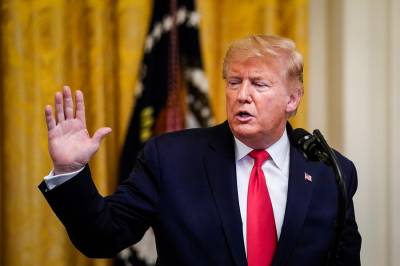While most of Washington was focused on Donald Trump’s impeachment trial last week, the president made some comments on another subject that went almost unnoticed but warrant some attention.
Addressing a group of mayors at a White House summit called Transforming America’s Communities, the president praised the cooperation of President Xi of China in the effort to control the trafficking of fentanyl into the United States. The president said he had insisted on help from China as part of the trade deal negotiated late last year. But rather than simply touting the progress that has (ostensibly) been made, however, President Trump chose to highlight the “strong penalties” and the speed with which Communist China’s court system deals with those implicated in the illicit fentanyl trade.
And they’ve put in very strong penalties, and their penalties are really strong. You want to talk about penalties? Those are strict. (Laughter.) And their court cases go slightly quicker than ours. (Laughter.) Like — like one day. One day. They call them “quick trials.” They go quick. (Laughter.) They go so quick, you don’t know what happened. (Laughter.) Ours take 15 years; theirs takes one day. But he was — he’s been terrific on that. And we’re seeing a tremendous — a tremendous difference in the fentanyl.
Note that the White House transcript of the remarks highlighted laughter from the audience several times during this portion of the president’s comments. As is often the case with President Trump, his injection of humor carries an underlying serious message: his tolerance of and even appreciation for authoritarian gestures. In this case, he clearly admired the unsparing efficiency of the Chinese criminal justice system. “Ours take 15 years; theirs takes one day.”
Even discounting for his ever-present hyperbole, the president fails to recognize that the efficiency of the Chinese system comes at the expense of individual rights and liberty. Trump’s own State Department has condemned the arbitrary detention of nearly 1 million Uighur Muslims without even the benefit of, in the president’s words, a “quick trial.” Just last month, the Trump administration decried the treatment of Pastor Wang Yi, a church leader in Chengdu, China, who was “was tried in secret and sentenced to nine years in prison” for the “peaceful advocacy for religious freedom.” In that case, “[the trials] go so quick, you don’t know what happened” most certainly held true. These abuses highlight the long list of abuses in the 2018 State Department report on human rights in China.
And yet, in pursuit of his much ballyhooed trade deal with that same government, the president makes light of not only the “quick trials,” but of the harsh penalties meted out by the lightning-fast court proceedings: “You want to talk about penalties? Those are strict. (Laughter.)” Strict indeed. In November, in the midst of trade negotiations, a Chinese court sentenced nine people in an opioid smuggling case: All nine were imprisoned, two for life and another received a suspended death penalty sentence.
This is not the first time President Trump has found good things to say about draconian or even ruthless extrajudicial measures taken by a foreign regime in response to crime. In 2017, several news organizations obtained a transcript of a phone call between President Trump and President Rodrigo Duterte of the Philippines. Trump told Duterte, “I just wanted to congratulate you because I am hearing of the unbelievable job on the drug problem. Many countries have the problem, we have a problem, but what a great job you are doing and I just wanted to call and tell you that.” At the same time, it was widely reported that Philippine law enforcement agents had killed thousands of suspects in the streets rather than bother with arrests and trials.
Similarly, Trump's affinity for Vladimir Putin, who Trump has called a "strong leader," has resulted in troubling justifications and downplaying of bad behavior. In 2015, in response to Joe Scarborough's remark that Putin is "a person who kills journalists, political opponents, and invades countries," then-candidate Trump replied, "He's running his country, and at least he's a leader. Unlike what we have in this country." Trump's deference to Putin has continued into his presidency, joking with Putin about "get[ting] rid" of journalists and complaining about Senate-passed sanctions on Russian companies and individuals.
When the leader of the free world gives tacit approval to kangaroo courts or summary judgment of accused criminals by authoritarian governments or strongmen even in pursuit of laudable goals, he risks complicity in immediate harm to individuals caught up in corrupt systems and long-term harm to the cause of freedom and justice throughout the world.






Please note that we at The Dispatch hold ourselves, our work, and our commenters to a higher standard than other places on the internet. We welcome comments that foster genuine debate or discussion—including comments critical of us or our work—but responses that include ad hominem attacks on fellow Dispatch members or are intended to stoke fear and anger may be moderated.
With your membership, you only have the ability to comment on The Morning Dispatch articles. Consider upgrading to join the conversation everywhere.